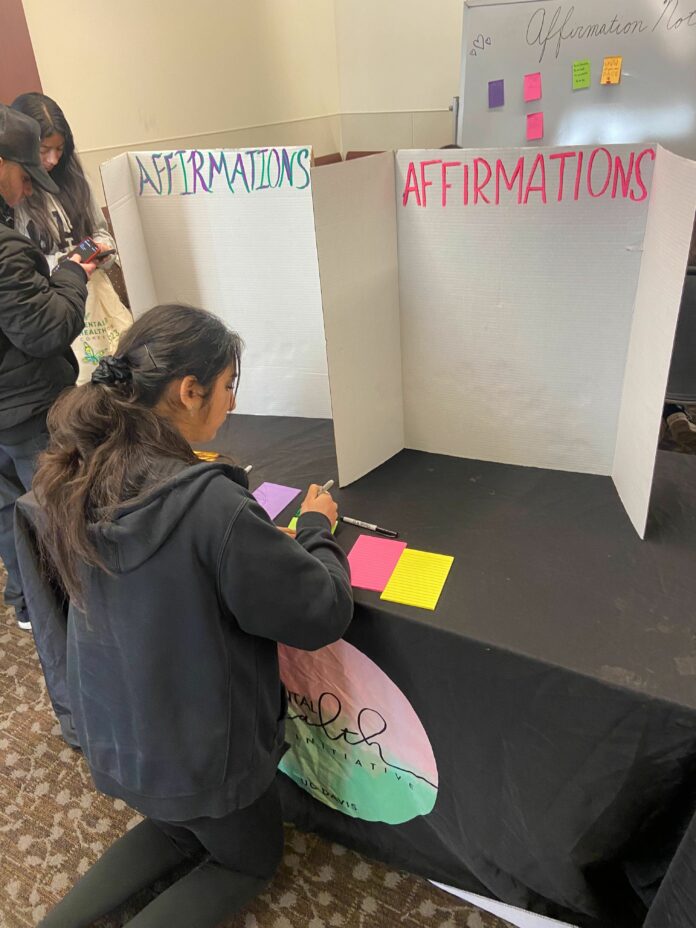UC Davis Mental Health Initiative conference raised awareness for mental health advocacy and promoted several on-campus student resources
By LILY FREEMAN — campus@theaggie.org
On Jan. 21 and Jan. 22 UC Davis Mental Health Initiative (MHI), a student organization dedicated to mental health advocacy, held the 2023 Mental Health Conference.
Dylan Ocampo, a fifth-year biopsychology major and the unit director of MHI, described the goals for the two-day event.
“We just wanted to give folks the space to unpack these topics that we don’t necessarily discuss within our daily spaces,” Ocampo said. “A lot of our advocacy stems from educating the people who come to events like our conference and then for them to spread what they unlearned and learned to their peers and communities.”
Two keynote speakers were featured at the event, according to Ocampo. Jenee Darden, an award-winning journalist, public speaker and mental health advocate, and Imadé Borha, a writer and mental health advocate who founded the nonprofit Depressed While Black, both spoke about their work on Black liberation within the mental health field.
The conference also included a variety of workshops surrounding intersectionalities within mental health, which Ocampo said included topics like substance abuse, the Latinx and Hispanic communities, the connection between hip-hop music and mental health, the neurodivergent perspective and how to build healthy relationships through setting boundaries.
Following these workshops were student and professional panels meant to facilitate conversation between attendees and community members dedicated to mental health advocacy, as well as “caucuses,” or small-group discussions between attendees. Ocampo explained that the discussion-based caucuses explored intergenerational trauma, toxic positivity and productivity culture.
The conference ended with a resource fair featuring several on-campus mental health organizations. Aggies for Recovery, the Aggie Mental Health Ambassador Program, the Willow Clinic, the UC Davis Love Lab, the Aggie Compass Basic Needs Center and the UC Davis LGBTQIA+ Resource Center were just some of the organizations that attended.
Johnalyne Love Samson, a fourth-year psychology major and the chief of staff of MHI, explained her main takeaways post-conference.
“One of the lessons MHI has taught me is that we need to make time for the things we want to happen,” Samson said. “Destigmatizing mental health happens when we put effort into starting conversations with others about things we often only let ruminate inside our own thoughts.”
Radhika Gawde, the ASUCD president, spoke on the conference’s focus on diversity and intersectionality in their programming from her perspective as an attendee.
“MHI’s focus on intersectionality is incredibly important as the impacts of factors such as race, gender and socioeconomic status are often overlooked in conversations about mental health,” Gawde said.
MHI is currently working on its upcoming May Mental Health Awareness Month project. Ocampo explained that the organization’s recognition of the national awareness month will consist of weekly events and advocacy projects surrounding a variety of mental health topics.
Natalie Bruch, a fourth-year psychology major and the publicity coordinator of MHI, emphasized the next event, “Brain Freeze,” for community members to look forward to on Feb. 18. MHI will have various de-stressing activities available for students to participate in at the event, according to Bruch.
“We will be partnering with the Entertainment Council to put on the Brain Freeze event, where Raveena, the singer, will be performing,” Bruch said. “It is an event to help students de-stress mid-quarter.”
Ocampo ended with his reflections post-event.
“I always tell my team no matter how big or small the contributions you make towards mental health, they still matter,” he said. “The conference just reminds me of our impact on the broader whole community, even if we may not see the total scope of our impact. We have each other and community to rely on, and this conference helped me feel this and see it in action.”
Written by: Lily Freeman — campus@theaggie.org




